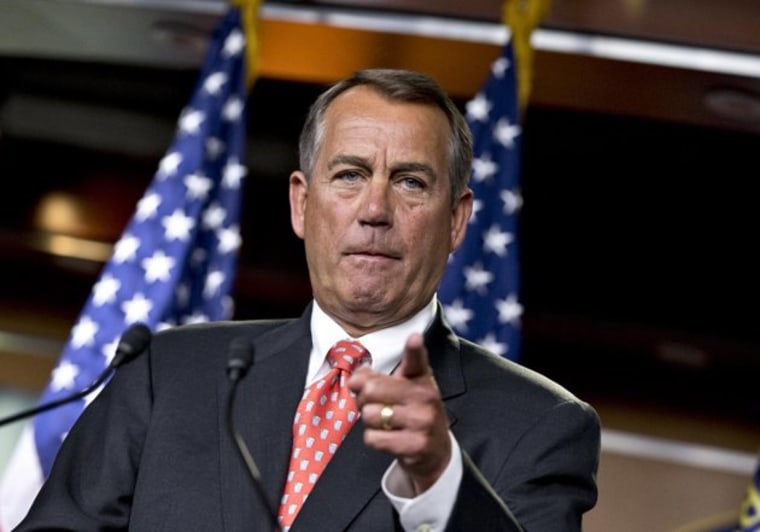Republicans presented their fiscal cliff proposal to President Obama and Democrats Monday, claiming to strike a "fair middle ground" by "coupling spending cuts and reforms with new tax revenue."
The Republican proposal, signed by Boehner and House colleagues, uses "Erskine Bowles' proposal" to the Joint Select Committee as a framework. It calls for $800 billion in new revenue, $500 billion in mandatory and discretionary spending cuts, and $600 billion in health care savings.
The revenue comes from tax reform, not from raising rates, which, as Boehner wrote, "we continue to oppose and will not agree to in order to protect small businesses and our economy." This is a major sticking point in the negotiations, as Obama has indicated that rates must be included in any reasonable deal.
As for entitlements, Boehner tried to strike a conciliatory tone, recognizing "it would be counterproductive to publicly or privately propose entitlement reforms that you [the president] and the leaders of your party appear unwilling to support in the near term." The Speaker then suggested, as part of the Republican plan, increasing the eligibility age for future Medicare recipients--something Obama considered in Grand Bargain talks last year, but which was not included in his opening bid.
Throughout the proposal, Boehner paints Obama's proposal as uncompromising and partisan, and asks him to "refrain from any further action that would undermine good-faith efforts to reach a reasonable and equitable agreement." In contrast, Boehner's own Erskine Bowles' proposal is framed as a concession from the House-passed Budget Resolution, which, he claims, would be the in-kind response to Obama's opening bid.
Erskine Bowles came out Monday and pushed back against the use of his name in the Republican's proposal:
While I'm flattered the Speaker would call something "the Bowles plan," the approach outlined in the letter Speaker Boehner sent to the President does not represent the Simpson-Bowles plan, nor is it the Bowles plan. In my testimony before the Joint Select Committee on Deficit Reduction, I simply took the mid-point of the public offers put forward during the negotiations to demonstrate where I thought a deal could be reached at that time.
Bowles went on to say "circumstances have changed" since the Joint Select committee failed to reach a deal, entreating both sides to push beyond their opening positions and reconvene closer to the middle.
